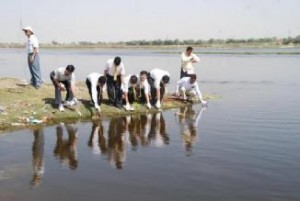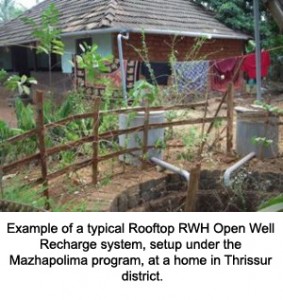Governance
Vacancy: NUNV project officer - UNDP
Posted on 29 Apr, 2009 03:34 PMForwarded to the Portal by: Sharadbala Joshi, UNDP India  The Water for Asian Cities Programme is a collaborative initiative of the UN-HABITAT, the Asian Development Bank (ADB) and the Governments of Asia. The WAC Programme was officially launched at the 3rd World Water Forum with a Memorandum of Understanding signed between ADB and UN-HABITAT in March 2003 in Osaka (Japan). The main objective of the programme is to promote pro-poor investments in water and sanitation to support Millennium Development Goals in Asian cities, specifically promoting pro-poor governance, water demand management, increased attention to environmental sanitation; and income generation for the poor linked to water supply and sanitation. Complete Terms of Reference / Job Profile: http://data.undp.org.in/jobs/UN-HabitatKarnataka.doc Description of Duties: Under the direct supervision of the Chief, Water and Sanitation Section II, WSIB, UN-HABITAT Nairobi and Regional CTA, South Asia WAC, the UNV will be responsible for implementing UN Habitat related activities as well as complement the wider activities under the Integrated Urban Water Management Programme in Mulbagal.
The Water for Asian Cities Programme is a collaborative initiative of the UN-HABITAT, the Asian Development Bank (ADB) and the Governments of Asia. The WAC Programme was officially launched at the 3rd World Water Forum with a Memorandum of Understanding signed between ADB and UN-HABITAT in March 2003 in Osaka (Japan). The main objective of the programme is to promote pro-poor investments in water and sanitation to support Millennium Development Goals in Asian cities, specifically promoting pro-poor governance, water demand management, increased attention to environmental sanitation; and income generation for the poor linked to water supply and sanitation. Complete Terms of Reference / Job Profile: http://data.undp.org.in/jobs/UN-HabitatKarnataka.doc Description of Duties: Under the direct supervision of the Chief, Water and Sanitation Section II, WSIB, UN-HABITAT Nairobi and Regional CTA, South Asia WAC, the UNV will be responsible for implementing UN Habitat related activities as well as complement the wider activities under the Integrated Urban Water Management Programme in Mulbagal.
CEPT UWSS benchmarking and performance assessment project
Posted on 29 Apr, 2009 11:56 AM
 CEPT University has received a major grant from the Bill & Melinda Gates Foundation to research urban water and sanitation issues. The aim of this programme is to develop better information on water and sanitation performance at the local level. This in turn will be used by the state and local governments for extending services to the poor, strive for financial viability, and improve reliability and quality of services.
CEPT University has received a major grant from the Bill & Melinda Gates Foundation to research urban water and sanitation issues. The aim of this programme is to develop better information on water and sanitation performance at the local level. This in turn will be used by the state and local governments for extending services to the poor, strive for financial viability, and improve reliability and quality of services.
The research will focus on the use of performance indicators and benchmarks to facilitate consistent reporting, monitoring, planning, budgeting, and investing in water and sanitation services in all urban areas of Gujarat and Maharashtra states. Lessons from the project will be disseminated to other states and at the national level.
CEPT University with its partners will work with state and local governments to develop a reliable and sustainable Performance Assessment System (PAS) for urban water and sanitation services. The PAS envisaged in this project includes: Performance Measurement, Performance Monitoring, and Performance Improvement.
Young professionals initiative by Indicorps
Posted on 23 Apr, 2009 12:40 PM Indicorps invites young Indian professionals interested in committing their time and skills to India to apply for its new sabbatical program: The Young Professionals Initiative (YPI). YPI is a pilot program designed to encourage young working professionals to contribute their skills and knowledge to the land of their heritage in a meaningful way. The core fellowship program aims to inspire a new generation of global Indian leaders through structured grassroot public service opportunities. Indicorps projects embody a firm and demonstrated commitment to promoting peace, inclusiveness, secularism, and the empowerment of Indians.
Indicorps invites young Indian professionals interested in committing their time and skills to India to apply for its new sabbatical program: The Young Professionals Initiative (YPI). YPI is a pilot program designed to encourage young working professionals to contribute their skills and knowledge to the land of their heritage in a meaningful way. The core fellowship program aims to inspire a new generation of global Indian leaders through structured grassroot public service opportunities. Indicorps projects embody a firm and demonstrated commitment to promoting peace, inclusiveness, secularism, and the empowerment of Indians.
The Sambalpur declaration on Odisha rivers : Let the river flow
Posted on 23 Apr, 2009 12:04 PMWater Initiatives Orissa(WIO) and the Indian River Network (IRN) organsied the Odisha River Conference during 18 - 20 April 2009 at Sambalpur, Odisha. Attended by about 75 participants which included activists, environmentalists, journalists, academicians, researchers and civil society representatives from across the country, the Conference has just concluded with a "Sambalpur Declaration" that calls for saving the rivers from the current fate of high rate of degradation and giving communities their traditional rights over the rivers, among other strong resolutions.
Agra: Yamuna river trash cleanup 2009
Posted on 23 Apr, 2009 11:45 AMAhead of the Lok Sabha polls, hundreds of students of several schools along with senior citizens cleaned up Poiya Ghat Sunday morning, picking up rags and used polythene bags, to focus attention on river pollution which candidates of various political parties have chosen to ignore.
Brij Khandelwal, programme convener of the Yamuna Foundation and Rivers of the World Foundation, said apart from students involved in the My Clean Agra initiative, a large number of other voluntary groups and organisations were involved in Sunday's programme which specifically targeted the politicians for failing to clean up the cities and the rivers of India.
"No political party has bothered to say a word about how they would save a dying river and rejuvenate it or restore its original glory," said Subhash Jha and Haridutt Sharma of the Yamuna Foundation for Blue Water.
Agilent Technologies: "India Innovation Initiative - i3" competition
Posted on 20 Apr, 2009 01:59 AMThe objective of the India Innovation Initiative project is to create an innovation eco-system in the country by sensitizing, encouraging and promoting innovators and facilitating commercialization of the innovations. DST and CII jointly launched the Young Inventors initiative "Steer the Big Idea" in the year 2004. It was aimed at capturing the innovative ideas from young innovators for the benefit of Industry & society. In 2005, CII & DST joined hands with Industry to form IRIS - Initiative for Research and Innovation in Science. IRIS has been focused so far on school students i.e. innovators below the age group of 18 years. Agilent has been organizing the Agilent Engineering and Technology Awards through which it has been encouraging engineering students towards hands-on engineering in India and recognizing innovation. CII & DST have now joined hands with Agilent in a combined effort to launch a nation-wide innovation competition for all innovators above the age group of 18+: "India Innovation Initiative - i3". i3 aims to capture the innovative ideas from the Indian innovators in the age group of 18 years and above, including students, innovators from R&D Institutes & Labs, Industry professionals and individual innovators / Entrepreneurs, grassroots innovators etc. The topic for the 2009 event is "Technology Innovation for Masses and Global Impacts".
District panchayat office in Kasaragod, Kerala, uses rainwater harvesting to tap the overhead source: a case study
Posted on 16 Apr, 2009 01:07 PM"Plenty on the roof", is a case study written by Shree Padre in August 2005, of how a district panchayat office in Kerala, used rainwater harvesting not just to overcome shortages in piped supply, but to tap the overhead source, so that no other source was needed.
Recharge of deep borewells in hard rock terrain
Posted on 14 Apr, 2009 11:11 AMIndia's dependence on the underground aquifer especially deep bore wells are well known. With over 22 million wells India has perhaps one of the largest such structures in the world. Since most of peninsular India is hard rock with basalt/granite/gneiss underlying they present a particular challenge for understanding.
Right to safe drinking water: managing water for drinking
Posted on 14 Apr, 2009 10:25 AMUN committee on economic, social and cultural rights in 2002 issued a general comment on the right to water. However, provision of safe drinking water remains a challenge.
"Mazhapolima"? : Participatory well recharge programme in Thrissur district, Kerala, part 2
Posted on 13 Apr, 2009 03:35 PMThe Mazhapolima program is quite unique; it aims to (eventually) recharge about 4.5 lakh dug wells in the district, and do this through community awareness and action. It's driven by the District Collector, Mr. Kurian Baby, who strongly advocates sustainable, local development & innovation.
A Gram Panchayat (GP) in Kerala is fairly large, and has a population of approximately 20000 people, as compared to about 10000 in Karnataka, and about 700 in Uttar Pradesh. GP's have ward divisions, about 20 of them per GP. Each GP has a staff of at least 6-8 people. The GP that we visited - Adat, had about 12 employees , 4 lower division clerks, 3 upper division clerks, 1 Joint Secretary, 1 Secretary, 2 peons and 1 sweeper. Except for the peons and the sweeper, the employees are all usually SSLC-pass, but here in Adat they were mostly graduates. For salaries alone, the GP spends about Rs 1.5 lakhs per month. Adat GP executed 124 projects last year. The GP's annual budget was Rs 1.40 crores, not including NREGA funds. Out of this, Rs 40 lakhs was raised by the GP through property taxes etc. Most other parts of the country, GP budgets are only about 5 to 10 lakhs. The Adat GP office was a large 2 storeyed building. Mr Vijayan, the Joint Secretary proudly showed us their awards, which filled up an entire wall.








